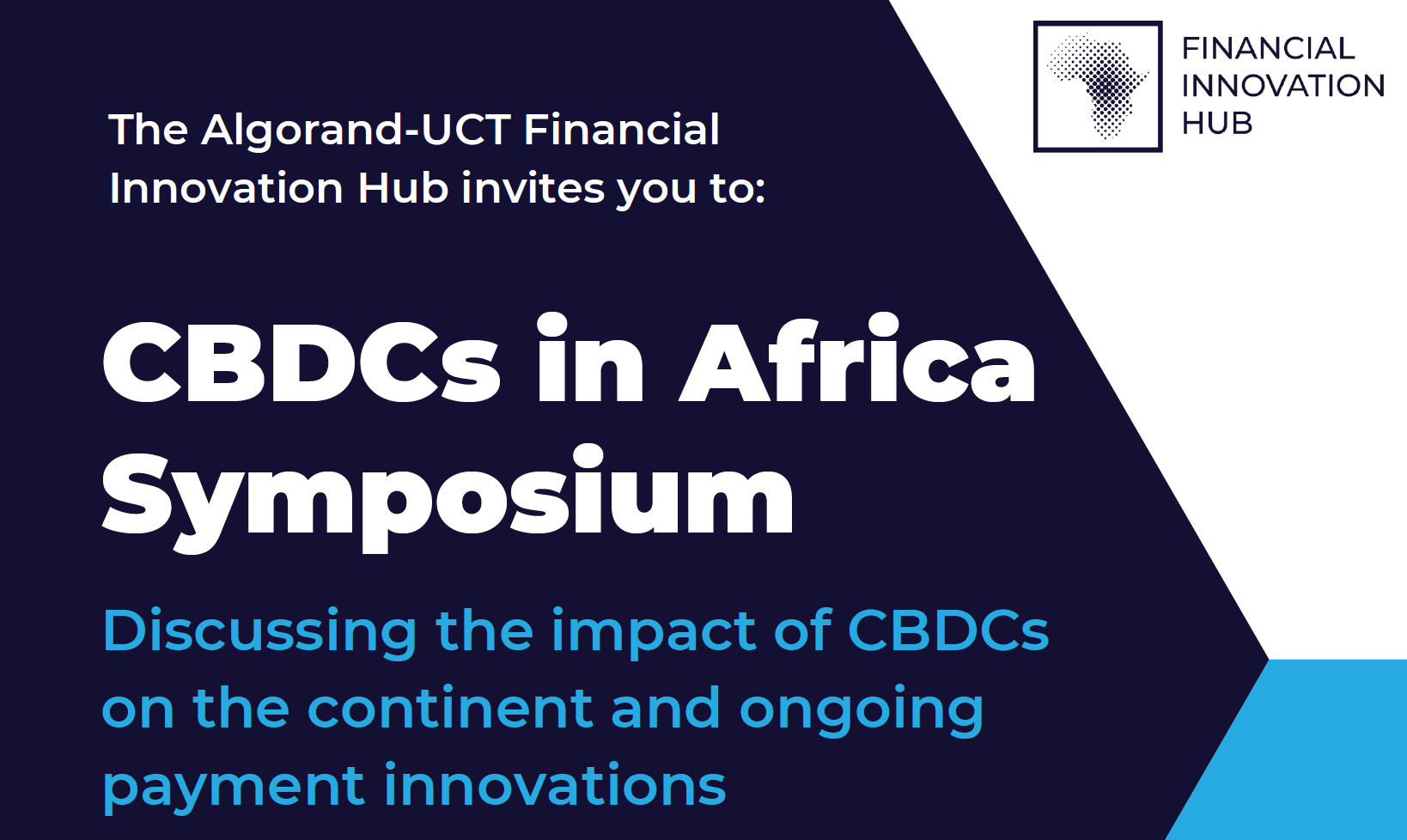Last month, I attended the Central Bank Digital Currencies (CBDCs) in Africa Symposium at the University of Cape Town (UCT) Graduate School of Business (GSB). The event, which was put together by the Algorand-UCT Financial Innovation Hub, comprised of a diverse audience which included central bankers, policy makers, financial technology (FinTech) professionals and academics. The panel discussion had two sessions, the first discussed CBDC projects being carried out by African central banks (notably the Central Bank of Nigeria and the South African Reserve Bank), and the second took a broader view on not just CBDCs but ongoing payments innovation.
What are CBDCs?
CBDCs are an especially hot topic at present, particularly amongst central bankers and the fintech community across the globe. Central Banks are harnessing the technology used in crypto assets to develop CBDCs. But what are CBDCs? CBDCs are a new and digital form of sovereign currency on an alternative and more efficient payment rail – a rail that is typically based on distributed ledger technology (DLT) e.g. blockchain – and not available in cash form. Essentially, CBDCs are akin to traditional fiat currency (footnote – fiat currency is government-issued currency that is not backed by a commodity such as gold.), albeit on a different payment rail. The promise of CBDCs is reduced frictions in financial services and payments e.g. cheaper and faster payments (especially since there is no need for multiple intermediaries between the source of a transaction and its destination – as is currently the case), as well as increased interoperability and programmability (which unlocks innovation) within financial services.
Central Banks and their digital currencies
Nigeria, South Africa and Ghana are some of the African countries that gone beyond research and launched CBDC pilots in one form or another. Nigeria, which is arguably leading the charge, launched the e-Naira project. South Africa launched the project Khoka pilot and recently participated in project Dunbar. Ghana launched the e-Cedi project. Other countries such as Namibia, Zambia and Zimbabwe have hinted at exploring the use of digital currencies, and are presumably in research stage – see the BCG CBDC tracker.
A recurring theme from the discussants was the cautious approach adopted by central banks as CBDCs are unchartered territories that will require amendments to policy and legislation, which they would want to get right. Another topic of discussion was privacy preservation – the need by citizens to maintain a level of transactional privacy (restrict a state’s oversight into an individual’s transactions) – something afforded by cash. The consensus here seems to be affording privacy for small value transactions and providing quasi-privacy or the ability to inspect – on-demand – large value transactions for regulatory purposes.
The first session ended with a thought-provoking question – whether proceeding slowly and cautiously by central banks is of more negative consequence than moving fast and being wrong – food for thought.

CBDCs and ongoing payments innovation
The second panel discussion zoomed out from CBDCs and considered more general and ongoing payments innovation. Interoperability between payment mechanisms and systems was highlighted as low hanging fruit with potential upside. For example, in the case of South Africa, a number of FinTech payments startups allow scanning of QR codes for payments but are not necessarily interoperable (e.g. Zapper and SnapScan), which would be a plus for merchants and a boost for commerce. Similar to QR Code payment apps, a comment was asked about why loyalty points are operated behind closed silos instead of being opened up and becoming tradeable across different providers and merchants (e.g. FNB eBucks, Standard Bank uCount, Pick n Pay smart shopper points etc). The rapid payments program (RPP) by BankServ Africa was highlighted as an innovation enabling interoperability initiative. The RPP is an interoperable payments platform that will bring together banks and non-bank FinTechs as service providers, and offer easy to use payment options for South African’s.
As in the first session, the theme of regulation reared its head again – with the sentiment being that although regulation moves slower than innovation, it is necessary. But of course overregulation can kill innovation altogether – there is a risk of throwing out the baby with the bath water!
One of the panellist’s took a necessary step back and put across a cornerstone notion that the problem we are trying to solve with CBDCs and payments innovation is not necessarily a problem of a broken past (i.e. present day financial infrastructure is relatively robust and functional) but more of what can we do for the future (from a technology, people and policy perspective) to improve from where we are. Ultimately, the focus should not be the payment rail but what it enables.
Lastly, one of the open questions arising from this session was whether CBDCs and current payments innovation will make a huge dent in solving the problem of financial inclusion – another piece of food for thought.

Summing up the conference, we are experiencing a fundamental shift in payments innovation and infrastructure, but fundamental shifts can be hard to recognise. The benefits of using blockchain as a payment rail are hard to ignore – faster transaction speeds, lower costs and programmability – all of which increase efficiency and participation and unlock innovation. CBDCs promise to be the next evolution of money, and not only central banks but fintech players need to be adaptive, agile and anticipatory.
P.S. Want to be notified when there is a new post on my blog? Enter your email address and click Subscribe below.
